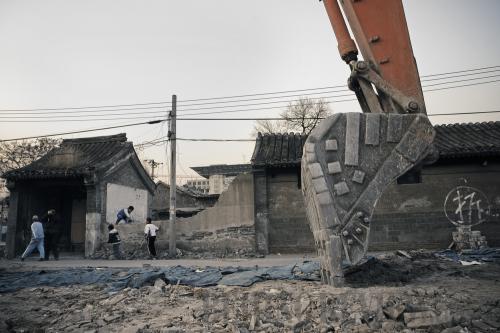|
 |
|
DISAPPEARING CITY: Many old buildings have been demolished in downtown Beijing in recent years to make way for the construction of new landmarks. The picture shows a demolition site in Beijing's old Qianmen area in 2005 (WANG XIANG) | Jiang is not alone in being optimistic. Professor Wang Xixin, who also signed his name on the open letter, told Xinhua that the draft showed "great progress."
One of the major problems of the current demolition regulation is that it focuses solely on "demolition" and "administration," said Wang, while the draft revision adds "expropriation" before "demolition" in its title and emphasizes the process.
Wang also expects a fair solution to the compensation problem in the expropriation and demolition procedures. Compensation has long been at the core of demolition disputes, he said.
Wang maintained that the new solution should prevent the government from coercing deals through unilateral pricing, while also preventing the common problem of property holders profiteering from their houses.
"My suggestion is the market price should be taken as a benchmark for compensation," he told Xinhua.
Wang Liming, a law professor at the Renmin University of China whose opinions were solicited at the experts' discussion, said if homeowners and government cannot agree on the market price, they should hire an independent agency to appraise the value. He also suggested that if a dispute arises, it should be settled within the judicial system since government cannot judge a dispute between itself and another party.
Scholars have also called for better information disclosure by the government in relocation and demolition procedures.
Interest coalition
Peking University's Professor Shen Kui explained the importance of defining public interest by the new land expropriation regulation. He said disguising commercial interest as public interest is an important reason behind frequent confrontations between homeowners and those evicting them. In many cases, local governments have been criticized for seizing land from homeowners against their will and transferring it to private developers.
Some local governments act as backers for commercial land developers for the sake of the local economy and gross domestic product growth, which makes the disputes even more complicated, Wang told Xinhua. In China, revenues from auctions of urban land for commercial development go to local governments. Since home prices began skyrocketing in the beginning of 2009, income from land auctions has been accounting for a growing proportion of local governments' total revenue.
Cao Kangtai, Director of the Legislative Affairs Office of the State Council, told The Beijing News that local governments want the new regulation being formulated to "give a broad definition for 'public interest.'"
The Contract Law instead of administrative regulations should govern the terms and compensation for relocating homeowners and demolishing their properties for commercial development, Wang said.
China University of Political Science and Law Professor Cai Dingjian voiced concerns over the connections between local governments and property developers. He said even if the new regulation clearly defines public interest and forced demolition and compensation procedures, local governments still might choose only to implement clauses in line with their interests.
"In the process, old conflicts might be replaced by new conflicts," Cai told Xinhua. He also said it is important to require local governments to allow public participation in urban planning, which can help to win support from the masses.
Zhou Ruijin, a Chinese Academy of Social Sciences researcher, said that changing China's economic growth model would be a more fundamental solution to break down the coalition of interests between local governments and commercial developers.
"As long as local government officials need GDP growth to improve their merit record for promotion and also need land auction income for government expenses, they tend to stand by the developers instead of the masses," he told Xinhua. | 